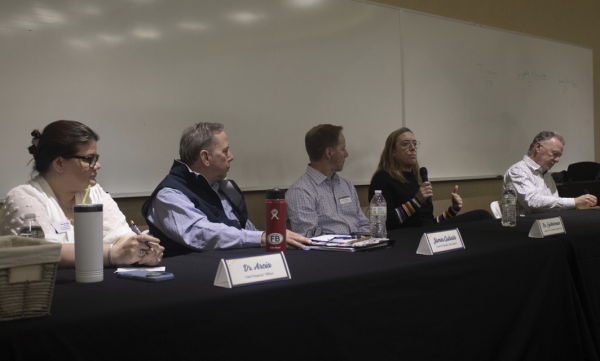Alcohol Conduct
Student Conduct and Conflict Resolution looks to empower students instead of punishing them.
According to the RWU Student Conduct and Conflict Resolution website, RWU is a community dedicated to learning, which is exactly what Diana Proto, director of the program, said when describing it.
“We are leaning into a more educational approach,” said Proto when asked about the decrease in fines. “Students have not demonstrated any type of educational benefit by getting a fine.”
Proto, who just started her second year at RWU, explained how not much has changed since she started. They streamlined the process, however, which is now easier to understand for both students and third parties and is composed of just administrative v. panel hearings.
The method and philosophy remain the same, but the program focuses more on helping students to problem solve and deal with interpersonal conflict rather than simply punishing them for misconduct.
“You can’t grow unless you have the opportunities to make mistakes,” said Proto. “And college gives you that opportunity. We want to empower students to solve problems and deal with conflict, to take accountability and move forward.”
Students have the ability to take something positive out of such a negative experience. For example, Proto noted that the program has seen an increase in bystander intervention.
Medical amnesty, which Proto describes as a call-for-help policy, allows for students to get another student the help they need if they’re in trouble. In doing so, both the student who called for help and the student who was helped, will not be held responsible for any drug/alcohol violation.
“We have a lot of caring students and bystanders,” said Proto.
Though medical amnesty’s main purpose is to help students, it only truly applies one time.
Despite the one-time guarantee, Proto stated that they see about less than 1,000 students in a given year.
“Even smaller of an amount come back,” said Proto when discussing the amount of students who are repeat offenders — though she prefers the word recidivism.
Proto, who is dedicated to lowering the number of students the program sees altogether, says that nothing is perfect and even though she can’t say what her office does helps, she really hopes it does.
When asked if the number of student misconducts increase on Halloweekend, which is traditionally the weekend before Halloween, Proto says they really don’t.
“At past institutions we have,” said Proto. “But last year it truly wasn’t anything remarkably more.”
Proto is not particularly worried about the upcoming weekend, but the department of Residence Life and Housing seems to be.
From Thursday to Saturday, each dorm has double the RAs roaming and double the CORE’s on duty.
Proto explains that to maintain the safety of the community, having the extra staff on call is typical in the event that extra support is needed. Added staff is not out of the ordinary during weekends where students may be more active in the residence halls and community.
When asked about Halloweekend plans, RWU Seniors, Marisa Rose and Sam Lugo, said that they will be heading to the bar, as they are of age, and don’t want to run into trouble with RWU’s drinking policies.
Similarly, Drew Abbott, a junior at RWU who’s also of age, says she’ll probably be heading to some party.
“I am always aware of the RWU student conduct [in regards to] drinking,” said Abbott. “Like with quantity limits for people and alcohol. I’m quite cautious, responsible and aware. I don’t want to get into trouble because of field hockey.”
Proto, who has nothing but positive things to say about students remarked, “I have found our students to be really wonderful students. I am proud of them.”





